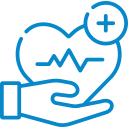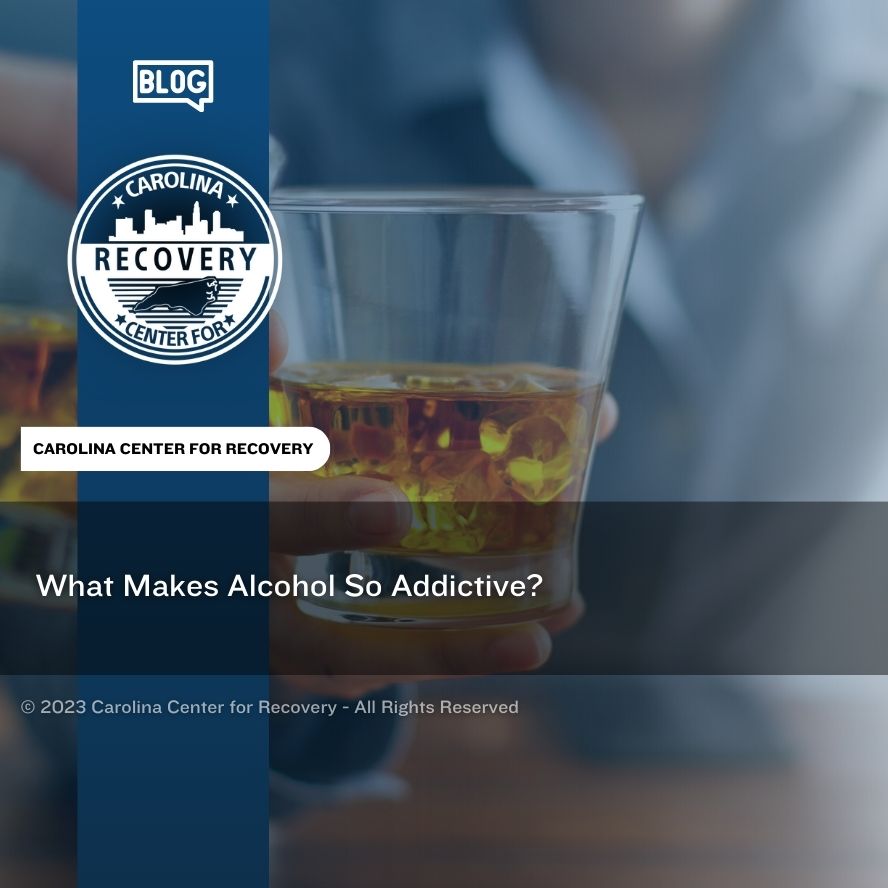Most adults in the United States drink alcohol from time to time. Alcohol is available in many social settings, is inexpensive, and is widely available for sale.
With alcohol use being widely accepted, many people report drinking occasionally. About 137.4 million people surveyed in 2022 reported drinking in the past month. More than 16 million struggle with unhealthy drinking patterns or heavy drinking that increases the risk of alcohol dependency and addiction.[1]
But why do some people become addicted to alcohol in the first place? Why is alcohol so addictive?
This article will explore why alcohol is addictive.
What you will learn:
- How alcohol addiction develops
- The factors that make alcohol addictive
- The effects and risks of drinking alcohol
- How to recognize alcohol addiction
- Where to find effective alcohol addiction treatment
Contact the specialists at the Carolina Center for Recovery to learn about our comprehensive alcohol rehab and support programs.
How Alcohol Addiction Occurs
An estimated 14 million people in the United States live with alcohol use disorder (AUD).[1] Untreated alcohol addiction or AUD can lead to serious, sometimes life-threatening health problems. People who are dependent on alcohol typically require significant treatment and continuing support to recover.
But how does a physical dependence on alcohol develop? Alcohol abuse and alcoholism typically begin when a person starts drinking more than health experts recommend. But how much alcohol is too much?
The Centers for Disease Control and Prevention (CDC) recommends that people drink only in moderation.[2] According to the CDC, moderate drinking means:
- One or fewer drinks per day for women
- Two or fewer drinks per day for men
The CDC defines heavy drinking as:
- Eight or more drinks per week for women
- Fifteen or more drinks per week for men
People who drink alcohol excessively may develop a tolerance to it. This means their body adjusts to a certain amount of alcohol. They may need to drink more to get the desired “buzz” or other pleasurable effects of alcohol.
Developing a tolerance to alcohol can lead to heavy or binge drinking patterns. Prolonged heavy drinking increases the risk of developing physical dependence on alcohol.
Why is Alcohol So Addictive?
According to information from The National Institute on Alcohol Abuse, several factors make alcohol addictive. Here are some of the ways alcohol affects the brain and can cause addiction.
Alcohol’s effects on the brain
Alcohol works in the body by activating the brain’s reward systems. People may feel happiness, relaxation, and pleasure while consuming alcohol. Alcohol also reduces activity in parts of the brain associated with emotional discomfort, stress, anxiety, and other negative emotions.[3]
Alcohol withdrawal symptoms
A prolonged period of heavy drinking can change how the brain and body function. When someone develops a physical dependence on alcohol, their body cannot function without it.[4]
If someone with alcohol addiction attempts to stop drinking “cold turkey,” they may experience intense withdrawal symptoms, including:
- Shaking or tremors
- Excessive sweating
- Anxiety
- Nausea
- Insomnia
- Diarrhea
- Headaches
- Body aches
- Elevated body temperature
Some people may develop more serious withdrawal symptoms, including seizures, confusion, or hallucinations. These symptoms can make it very challenging for people to quit drinking, even when the consequences of alcohol abuse are severe.
Changes in the brain
The human brain is capable of changing and adapting to new input. This can help people learn and develop new skills and adjust to significant changes in the environment.
However, the brain’s adaptability also means that people can become addicted to alcohol or other substances. Repeated alcohol exposure can change the brain’s structure and functioning.[5] These changes can make it very difficult for people with alcohol addiction to stop drinking.
Social pressure
Alcohol use is common in many parts of the United States. It is hard to avoid places that serve alcohol, and people may feel some social pressure to drink. People may also want to use alcohol to reduce social anxiety.
Socializing without alcohol can be challenging, and people with alcohol addiction may feel as though they need to drink to fit in or be “normal.”
Alcohol can be addictive, but heavy drinking can destroy your mental and physical health. People with alcohol abuse and addiction are at higher risk of liver disease, accidents, being the victim of an assault, and other severe consequences.
Learn the symptoms of alcohol addiction and seek treatment as soon as you recognize a problem.
Recognizing and Treating Alcohol Addiction
There are many reasons alcohol is addictive. However, it is crucial to watch for the symptoms of alcohol addiction. Then, you must seek treatment as soon as possible to avoid the harm it causes.
Some signs of alcohol addiction include:
- Needing to drink more alcohol to get “buzzed” or being able to drink a lot without appearing drunk
- Experiencing medical conditions, legal problems, or financial trouble related to your drinking
- Craving alcohol
- Experiencing alcohol withdrawal symptoms if you stop drinking
- Wanting to stop drinking but finding you can’t stop on your own
- Isolating, giving up hobbies, neglecting work, or ignoring relationships because of your drinking
Substance use disorder (SUD) treatment can help you put alcohol addiction in the past and focus on a healthier, sober future. Alcohol addiction treatment programs may include:
- Medically-supported detox programs
- Individual and family counseling
- Support groups
- Relapse prevention education
- Mental health and medical treatment
- Screenings
- Supervision
- Aftercare planning and support
If you or someone you love struggles with alcohol abuse or addiction, you are not alone. The effective treatment and support you need to recover are available at the Carolina Center for Recovery.
Contact our intake specialists now to explore our programs or schedule an intake.
References:
- National Institute on Alcohol Abuse and Alcoholism (NIAAA): Alcohol Use in the United States: Age Groups and Demographic Characteristics
- Centers for Disease Control and Prevention (CDC): About Moderate Alcohol Use
- NIAAA: Alcohol’s Effects on the Body
- National Institute of Health (NIH): Alcohol Withdrawal Syndrome
- NIAAA: Alcohol and the Brain: An Overview










